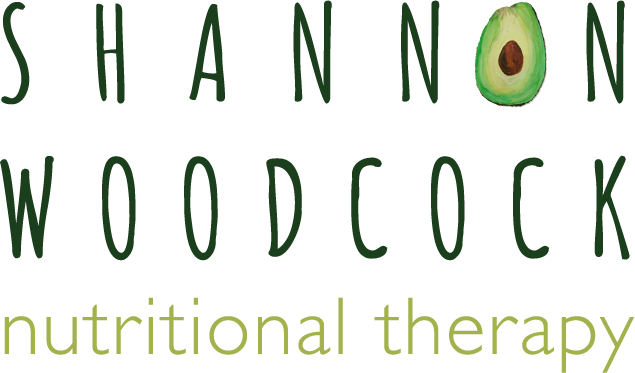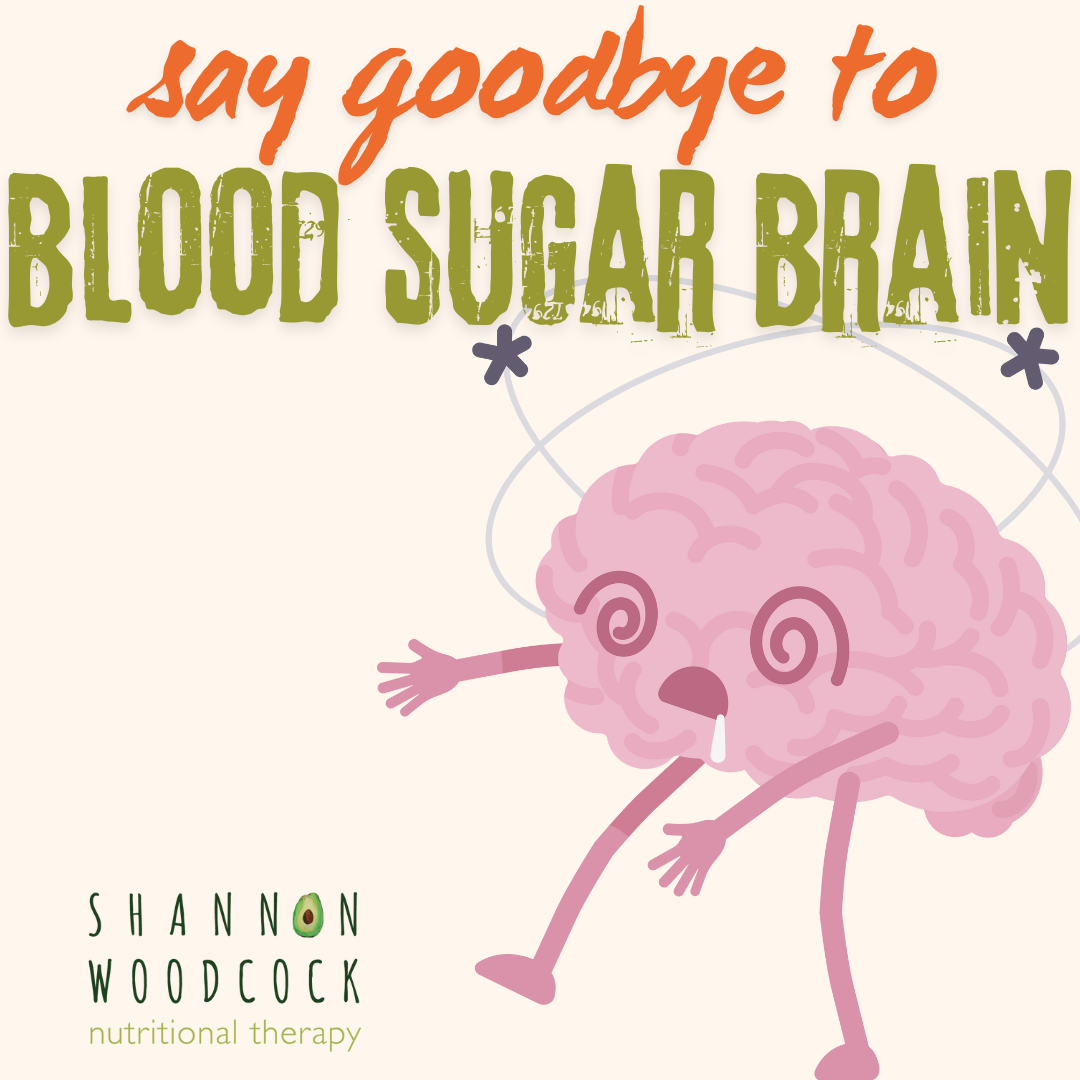Say goodbye to blood sugar brain…unraveling the not-so-sweet mystery between sugar & brain fog
Have you ever experienced that post-lunch slump that has you struggling to stay focused in a meeting or craft a concise email?
Do you tend to reach for a sweet snack or beverage to pick yourself back up?
Did you know this can actually make things worse?
In our fast-paced world, where quick meals and sugary snacks are go-to solutions for mid-day drowsiness, it's crucial to pause and consider the long-term effects on blood sugar, brain health, and if short-term sugary solutions to low energy might lead to bigger issues down the road.
Often, lurking behind the rush of a processed sugar snack glucose spike is brain fog—that sense of slight confusion, forgetfulness, and a lack of mental clarity that might linger all day long!
Are brain fog and lack of concentration issues you struggle with?
Sugar might be behind the wheel, driving you head-on into the mist…right into what I call blood sugar brain.
Processed sugar, the glucose rollercoaster, and blood sugar brain
The link between processed sugar consumption and blood sugar instability—glucose levels going way up and then way down versus gently rising and falling throughout the day—is well-documented across several age groups and demographics (1).
Studies highlight the immediate impact of sugar on the body and brain, noting that the rapid spikes and drops in blood sugar levels can lead to significant mood and cognitive fluctuations.
These instabilities are not just fleeting moments; over time, those with poorer glucose tolerance experience greater mood and cognitive disturbances, directly linking poor glucose control to brain power and mood (2, 3).
While this phenomenon is super easy to see in kids at a birthday party, it’s a lot easier to overlook it in ourselves!
A high-sugar breakfast or snack, for instance (maybe a stash of peanut M&Ms you keep in your desk…) feels energizing at the onset but is ultimately a setup for what I like to call “blood sugar brain.”
Is your brain inflamed?
Chronic inflammation, oftentimes a result of excessive processed sugar intake, also poses a big threat to cognitive health.
Consuming too many sugary foods can lead to chronic low levels of inflammation over time by increasing cytokines, a fancy name for immune proteins such as hs-CRP and IL-6, which send signals to increase the inflammatory response in the body. You might even have seen hs-CRP (or just CRP) on one of your blood tests.
Where does this sugar-driven inflammatory response come from?
Well, processed sugar stresses the gut, the liver, and even fat cells!
As these inflammatory cytokines accumulate, they disrupt your natural immune balance, causing a rift between anti-inflammatory and inflammatory messengers.
This eventually leads to a chronically inflamed state that is linked to diseases of all kinds but can show up as brain fog long before any diagnosis occurs.
Sugar-induced inflammation also has the ability to make our blood-brain barrier more permeable, aka “leaky brain.”
The blood-brain barrier is a highly functional membrane that separates circulating blood from the brain and spinal cord. When it becomes more permeable, these inflammatory cytokines can enter the brain and alert microglia, the brain’s immune cells, to initiate additional inflammation responses called neuroinflammation.
Neuroinflammation then leads to what we experience as brain fog through disrupting neurotransmitters such as dopamine, impacting how our neurons respond to stimuli and reducing our overall cognition and mood (2, 4).
The nutrients you miss when sugar takes center stage
The more often we reach for a sugary breakfast on the run or a sweet treat, the fewer opportunities we have to fill our belly with needed nutrition. Over time, this alone can lead to brain fog due to nutrient depletion.
We live in a culture where quick and easy is needed, but the replacement of nutrient-dense foods with higher sugar convenience foods is a significant concern for cognitive health.
Nutrients like B vitamins, omega-3 fatty acids, and flavonoids are essential for brain function, and their deficiency can lead to cognitive challenges.
B Vitamins are crucial for energy production and the maintenance of brain cells. Deficiencies in these vitamins can lead to tiredness and impaired memory and concentration, contributing to blood sugar brain.
Omega-3 Fatty Acids are the building blocks of brain cells' membranes and are essential for cognitive functions and mood regulation. Low levels of omega-3s have been linked to mood swings and mental impairments.
Flavonoids, found in colorful fruits and vegetables, as well as herbs and spices, have potent antioxidant and anti-inflammatory properties. They protect brain cells from damage and improve brain health. A diet high in sugar often lacks these crucial nutrients.
Emerging research underscores the nutrient-void nature of sugary foods and their impact on the body and brain, advocating for a balanced diet rich in essential, brain-powering nutrients (2).
Similarly, additional evidence (5) supports adding in flavonoid-rich foods to combat the cognitive impairments associated with dietary inflammation and nutrient displacement. Think: lots of veggies, fruits, and spices.
Clearing the sugary fog
The good news is that brain inflammation can be dampened with an anti-inflammatory diet.
Several nutrients, like luteolin, found in celery, parsley, broccoli, green onion, carrots, peppers, cabbages, and apples, and curcumin, most famously found in turmeric and curry powder, counteract the effects of inflammation and really work to dampen brain fog symptoms associated with inflammation.
This underscores the critical role of inflammation in brain health and the potential for dietary interventions to offer relief! Real food works!
Understanding the connection between sugar consumption and brain fog is the first step toward reclaiming our cognitive clarity. By replacing foods higher in sugar with more nutrient-rich choices, we can stabilize our blood sugar levels, reduce inflammation, and ensure our diet is rich in nutrients essential for brain health.
Here are some actionable steps to help clear the fog:
Reduce Processed Sugar Intake: Aim for a balanced diet and choose to indulge your sweet tooth with unprocessed sweet foods, like berries or apples, which also provide fiber and essential nutrients. Do your best to pair yummy fruits with protein or fat to reduce a significant spike in blood sugar, like pineapple with cottage cheese or an apple with almond butter. The goal here is to maintain stable blood glucose levels to support mood and cognitive function, i.e., avoiding blood sugar brain.
Incorporate Nutrient-Dense Foods: Prioritize foods rich in B vitamins, omega-3 fatty acids, and flavonoids. Think leafy greens, fatty fish, nuts, seeds, and berries. Spices such as turmeric, mentioned above, also show strong anti-inflammatory action in the body, so don’t hold back on the seasoning! Research highlights the cognitive benefits of a diet rich in anti-inflammatory compounds and essential nutrients that the brain needs to stay sharp and alert all day long! (5)
Stay Hydrated: Adequate water intake supports overall health and can independently prevent brain fog by keeping our gray matter hydrated. Even being 2% dehydrated impairs performance in tasks that require attention, psychomotor, and immediate memory skills. Before you reach for that mid-day pick-me-up, have at least 16 ounces of water and wait a couple of minutes to see if, like a wilted houseplant, you perk up without the need for chocolate-covered almonds or a granola bar, advertised as a healthy snack, but usually a place where LOTS of sugar is hiding (6).
My suggestion?
Start by choosing one of the three actions above to implement immediately. Then, layer in the strategies that may take more time or attention. Best of luck!
Do you need help getting things going?
My clients and RESTART participants report clearer thinking, focus, and concentration and more stable energy throughout the day when they get off the sugar rollercoaster!
Want to join them?
Click here to learn more about my RESTART course, a 5-week sugar reset that focuses on whole foods and a support



